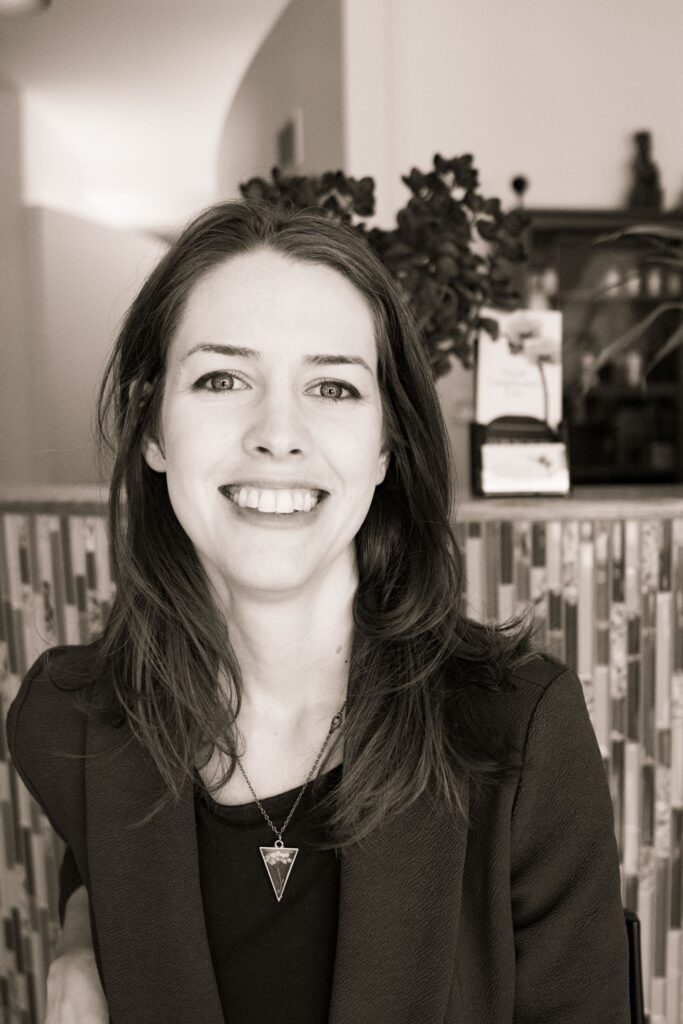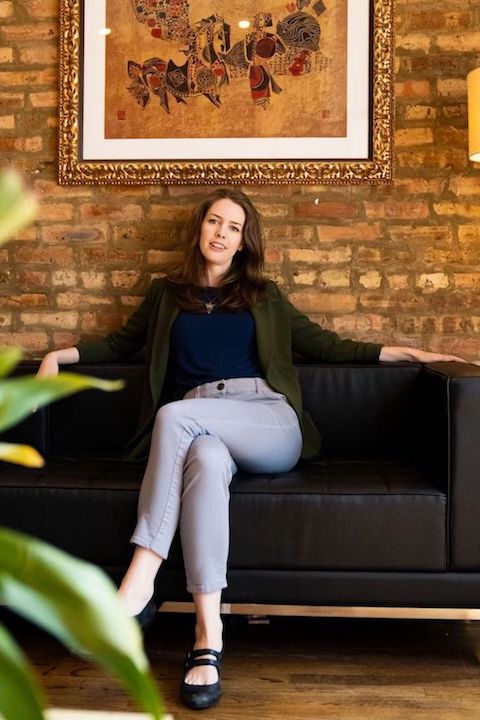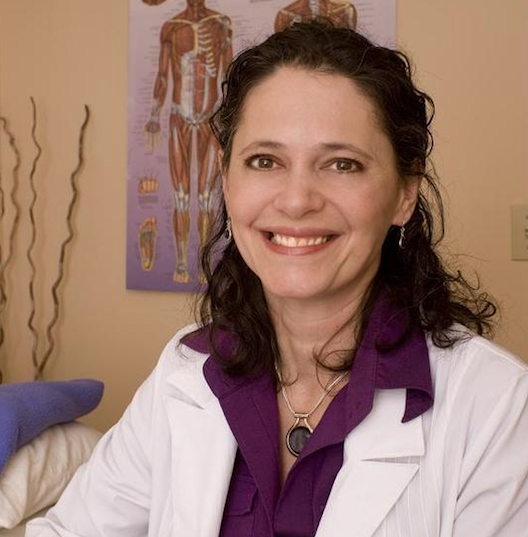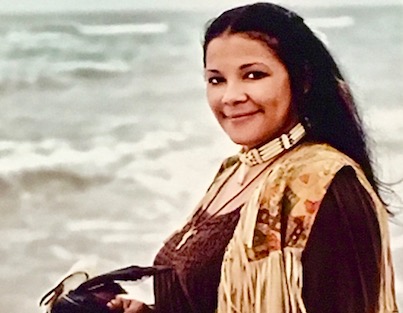Sarah Langthorne is a licensed acupuncturist and board-certified herbalist. She has worked in the health field for over a decade and has her own practice on the Northside of Chicago. Sarah combines her background in movement, martial arts and bodywork to further explore the body’s connections as they relate Chinese medicine. She believes in personal empowerment and in holding comfortable space to create lasting change, and her passion for patient education goes beyond the treatment room. She is a writer, presenter, and host of the upcoming podcast The Acupuncture Translator.
Welcome, Dr. Sarah Langthorne, L.Ac! Thank you for joining us for Acupuncturist of the Month!
So, how long have you been practicing acupuncture for, and what are your specialties?
I have been practicing acupuncture for about 4 years now, give or take. I love sports medicine, and thought I would mainly be doing that in my practice. Pretty much as soon as I graduated, I saw the massive gaps in other forms of healthcare specialties, such as emotional health and gynecology, and immediately began making that a key part of what I treat. I would say my practice is fairly well-rounded between athletics, emotional, and ob/gyn health.
Describe the vision behind your practice name, The Acupuncture Translator.
When I was treating patients as a student, they would ask me to explain what we were doing together, and how acupuncture/ Chinese medicine worked. I would always ask them “do you want the Eastern or the Western definitions?” I quickly learned that there are people who want to get into all the details of their treatments, and those who are drawn to acupuncture because they’re looking for a different medical experience; they don’t want to talk about chemical pathways and the nervous system. With all the biomedical and classical theory we’ve learned, I began to combine them, translating between East and West. It’s a priority for me not only that patients understand what we’re doing and why, but also that people who have no idea what acupuncture is or how it can help can also grasp an understanding. The training we’ve received to become licensed today has allowed me to be bilingual in my explanations, and I use that to demystify the medicine.
What inspired you to become an acupuncturist?
When I was a teenager, I found acupuncture because I had some hip/ abdominal pain that no one could diagnose, and spent years looking for both symptom relief and answers. Finally, my mom decided that I should go see the acupuncturist she had been seeing, and that -unsurprisingly- not only resolved my issues but made me feel actually seen and heard by someone in the medical community for the first time in years. That absolutely planted the seed for me.
How has your experience receiving acupuncture treatments as a teenager shaped the practitioner you are today?
It’s influenced everything. So many patients find acupuncture when they’re at the end of their rope and are feeling desperate. I still remember that feeling from when I was a teenager and acupuncture was not only the key to feeling better, but the only time a practitioner really held space for all the fear and stress that I was feeling from not understanding my own symptoms. I still carry this in the treatment room with me everyday.
How important is patient education within the acupuncture practice, and how does it help?
Extraordinarily. Especially in the Midwest, there are a lot of people who aren’t aware that seeing an acupuncturist can help them, how treatments work and what to expect from the process. Patient education is crucial to bring patients in the door and keep them coming back for as long as they need to. Education is also the way to teach patients how to take care of themselves through the lens of Chinese medicine, so that they aren’t again reliant on a practitioner for constant treatments and care.
How has your experience with telehealth been in educating patients about the benefits of herbal medicine?
It’s certainly taken a lot of education! People who don’t understand herbal medicine likely think I’m just recommending supplements that they can get at CVS. It’s also taken a lot of education to show people that acupuncturists can do much more than just acupuncture, and that as a board-certified herbalist, I have a lot of biomedical and herbal training. There is so much misinformation about herbal medicine out there, and I’m passionate about teaching people the difference.
You have a podcast called, The Acupuncture Translator; cool! Tell us more about how your podcast came to fruition. What can listeners expect to gain by listing?
Yes! It’s just coming out now! (You can find it on Apple and Spotify). It’s been a project long in the making that’s been influenced by all of the conversations I’ve had with patients over the years and their questions about the medicine. That has expanded into a passion for public outreach. So many people have no idea what acupuncture is, and I’d like to change that narrative.
On your journey to become an acupuncturist, what obstacles did you face and how did you overcome them?
A lot of it had to do with just getting through school. I had a really hard time there and was working throughout my program, which was absolutely draining. By my last year or two, I slowed down on the degree and put more work into myself, my health and my social needs, which was a crucial change I needed to make; I was able to end my master’s with a smile on my face.
Share a recent success story you had with a patient. What acupuncture points, herbs, or other interventions (meditation, yoga, nutrition, etc) did you use to help them achieve results?
I had a long-term covid patient who came in to see me a while back because he was feeling unbearably dizzy. He announced during our very first treatment that he was extremely skeptical about the whole process. Initially, his case seemed complicated, but I figured out pretty quickly that it was a simple formula, with barely any modifications necessary. I explained everything to him and included basic dietary instructions that I tend to give out a lot, (no dairy or cold foods or drinks. Increase warm beverages and easily digestible foods), and gave him Xiao Chai Hu Tang. He came back for his second visit almost flabbergasted because he hadn’t felt any symptoms for a week.
What makes you feel inspired about acupuncture?
The moment when a patient is telling me deeper aspects of their story and history, and it clicks that not only is there a clarity to their diagnostic pattern, but that they are trusting their provider, it means the world. When I can look into a patient’s eyes and say “I know exactly what to do for you” and see the hope and relief -and then provide that relief- it’s all worth it.
Looking back, what advice would you have given to the younger version of yourself, who was just getting started in this profession?
Start networking and gathering support and advice sooner. When I was in school, I was more quiet and kept to myself. I’d also recommend taking other business classes sooner. We get some training in school, but it’s honestly not enough.
What keeps an acupuncture practice going?
Connection, trust, and communication. You might be the best acupuncturist in the world, but if your patients don’t trust you, or feel like you’re not listening, or don’t understand your treatment plan, they won’t stick with you for long. We’re in the unique position where we’re both a medical and service industry. Patients come and go for a variety of reasons, but the ones who return come back for their experience with you.
What are specific roadblocks to watch out for as a new acupuncturist?
A really common thing that I hear from a lot of practitioners, (even experienced ones), is that they don’t want to network or advertise themselves because “they don’t like being salespeople” or they’re introverted. This I kind of find to be BS and it holds a lot of people back. There are countless ways to educate and network without feeling skeezy, and it’s common for people throughout the business world to also be incredibly introverted.
We have all occasionally had a patient come into our practice who is upset, frustrated, and a little angry. Maybe it’s from work, being stuck in traffic, or life in general – we have all been there! What advice would you give to fellow acupuncture students and/or colleagues on how to deal with situations like these?
This might sound weird, but I love anger. We’re taught that it’s a bad thing, and as a result, have little support in society to release it, so it becomes pent up. We as acupuncturists understand the connection between the body, mind, and emotions and the importance of maintaining emotional health. When someone comes into my office who is upset, I encourage them to let it out. Holding space for someone to release anger helps them build trust with you, and aids in their physical health in the long run. My best advice is to listen. If a patient is upset at you, they’ll tell you why (and you can fix it), and if they’re just letting off steam, paying attention to how they express themselves provides a lot of diagnostic information.
What are your favorite acupuncture points, and why?
I tend to needle the Lung and San Jiao channels a lot. They’re so versatile, and often right where people keep their physical stress. I really like how they can move a lot of stagnation in a gentle and tonifying way. I also regularly needle GB20, it’s a wonderful, knock out, power-point.
Tell us about some herbal formulas and foods you find yourself consistently recommending to your patients, friends, and colleagues. What makes these herbs/foods so helpful?
Some of the first changes that I tend to recommend are to cut out dairy and cold foods as much as possible, and to add warm, cooked, steamed foods into the diet. In the midwest, dairy is a main food group, and when people finally do cut it out, it’s impressive how quickly their bodies change.
Sometimes, the best resource for improving our skills is by learning from the other acupuncturists we meet along our professional journey. What is one thing you learned from a fellow acupuncturist or holistic practitioner that has helped you in your professional growth, or in your care for patients?
One amazing piece of advice that a teacher gave me that I still carry with me was about healthy boundaries. She talked about how no matter how much she cares about a patient or student, she never “takes them home”, meaning, once the interaction is over, it’s done. This is true for us as patients- we don’t think about our dentist or provider once we’ve seen them, and following this boundary practice has really allowed me to be as present as I am with patients in the treatment room. I can give my full attention because I know that it’s for a limited amount of time, and once the interaction is over, they’ll also be going about their day.
The COVID-19 pandemic has without a doubt had a significant impact on the acupuncture practice community and small businesses alike, and while it’s on the mend, we are still navigating through the new normal as acupuncture providers. How has COVID-19 changed your practice? Have you added or removed any services due to the pandemic?
From early 2020 to spring of 2022, I was working in an integrative clinic space. At the beginning, we were all figuring it out as more information was being published. It made me a specialist in providing not only a safe space to receive care, but in being a point of connection for people who worked from home and isolated as much as possible. It taught me a lot about people’s need to socialize and bond.
As I’ve been running my own practice, it’s inspired me to provide more stand-alone services that people didn’t necessarily associate with acupuncture, including nutritional consultations, herbal medicine, and telehealth appointments.
Do you have any daily habits or rituals that keep you at your “best-self”, both as an acupuncture practitioner and person?
At the end of the day, I have a short movement routine that I like to do right before pouring into bed. I’ve also been practicing gratitude and reminding myself about the positive or funny experiences that I’ve had in the day.
The kindest thing a patient said to you recently:
I get all warm and fuzzy any time a patient compliments the treatment room they’re in, and talks about how they feel in the space. I put a lot of effort into creating a specific feeling and I’m touched when it comes through.
The funniest thing a patient said to you recently:
A patient told me a story about meeting Elton John that had me almost doubled over. It was amazing.
As an acupuncturist, what are you most proud of thus far in your professional journey?
Honestly, all of it. I’m so grateful that I’m still here and practicing; many people left the field in a short time. I’m proud that I’ve worked in person throughout the past few years and have grown exponentially in technical and bedside skills because of it. It also still blows my mind anytime a person comes back for a follow up and all of their symptoms have changed for the better.
If you could have a billboard with anything on it, what would it be and why?
Either some ridiculous motivational quote that makes any driver chuckle, or my own face/ practice information. I would like to just make someone’s day a little better for a second by seeing something absurd, and I’ve always been camera shy, so the second option would be a hearty push out of my comfort zone.
What is your definition of success?
In general, work/life/self balance; being able to achieve your goals without sacrificing your health, creativity, or self-care. Of course, I have big career goals like everyone, but some days, I feel the most successful when I put all my work away and sit on the beach, or feel present with my family or friends.
If you could have one superpower what would it be and why?
That’s a hard one! I loved X-Men when I was younger, so if I could be a telepath, or move anything with my mind, (including myself), that would be amazing.

*Rapid fire questions! *:
Morning or night? Morning
Tea or coffee? Tea! I’ve been off the hard stuff for almost 2 years now!
Sun or moon? I love the sun, but the moon is just so pretty!
Cupping or Tui na? Cupping! I did massage and bodywork for several years before being licensed, and got it out of my system. I’ll still do it, if necessary
Yin or Yang? I’m pretty Yin, so I’ll choose Yang to keep me balanced
Meditation or exercise? Both, please!
Instagram or Facebook? Instagram
Spirit animal? The animals that have shown up repeatedly in my life are the snake and the deer. I’m also very much the type to point out just about any dog that I see, too.
Where can other licensed acupuncturists, students, and patients go to learn more about your work?
Sarah Langthorne, Licensed Acupuncturist & Board Certified Herbalist
The Acupuncture Translator
4361 N. Lincoln Ave.
Chicago, IL 60618
www.theAcupunctureTranslator.com
Instagram: @TheAcupunctureTranslator, @SarahLangthorneLAC
Facebook: The Acupuncture Translator page, Sarah Langthorne LAc page
Podcast: The Acupuncture Translator (on Spotify and Apple)
LinkedIn: Sarah Langthorne
Youtube: The Acupuncture Translator


